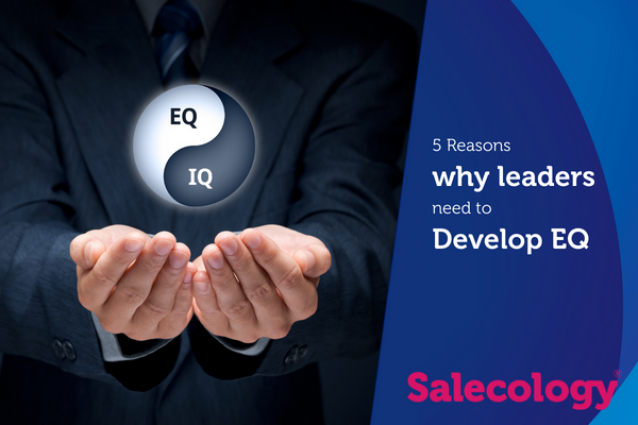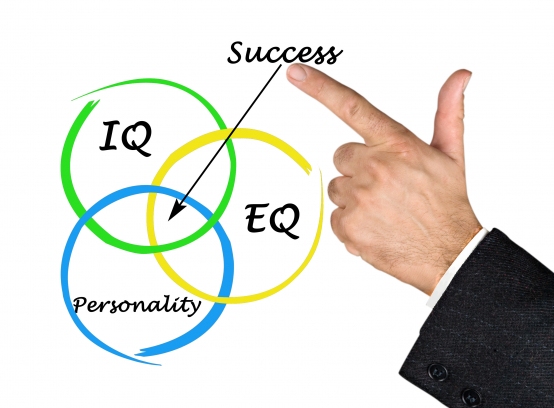
The idea of leadership is as old as human existence itself. Ever since the moment one became two, two became four, and four multiplied into tribes, villages, and economies, this remarkable quality to mobilize individuals and translate vision into reality was at the forefront of our story, our history. To quote the remarkable mind of Lao Tzu, “A leader is best when people barely know he exists, when his work is done, his aim fulfilled, they will say: we did it ourselves.”
At Salecology, we believe this sentiment gets right at the heart of what it takes to be a strong leader. Yes, intellectual intelligence (IQ) is important, but even more so is emotional intelligence (EQ). The leader in Lao Tzu’s quote is as fluid, encompassing, and invisible as air: a piece of them supporting every part of the process, every project, predicament, and person’s potential. This leader understands their true job is managing people, fostering positive relationships between members of their organization, and communicating effectively to reduce wasted time, money, and human capital. When their team succeeds, they too reap the rewards their emotionally intelligent, human-focused leadership.
When you look at the greatest CEOs and executives throughout the world, you'll notice that they all score high in EQ while often employing individuals with high IQs. This means the most intellectually gifted typically end up working for those who may not be as who likely score lower in IQ, but understand something fundamental about managing others. As a result, EQ has become more crucial to possess than IQ if you want to reach the very top.
So, what exactly is EQ and how does it differ from IQ? In the context of interpersonal interactions, it's your capacity to be aware of, influence, and express your own emotions, as well as sense and affect the emotions of others. In his Harvard Business Review essay, ‘What Makes a Leader?’ psychologist and author Daniel Goleman lists the precise components of emotional intelligence as self-awareness, self-regulation, motivation, empathy, and social skills. These elements can assist you in seeing subtlety, communicating effectively, and behaving sensibly. It is the difference between influence and authority, between “Go” and “Let’s go”. These five essential characteristics will make or break your capacity to be a successful leader, and so we strongly recommend you explore each with considerable time and attention if you have not done so already. Here are four reasons why emotional intelligence is essential for any leader:

1. The capacity to form deep bonds with others
As a leader, your ability to create rapport and manage long-term contacts has a direct influence on whether people will want to work with you now or in the future. EQ’s "social skill" component is this. Humans were made to connect, and so the capacity to form healthy relationships is an essential part of not only the human experience, but of what it takes to be a good leader. You'll need this magnetic appeal to connect, inspire, and influence others successfully.
2. Everything is affected by communication
Mike Myatt, a leadership counsellor to Fortune 500 CEOs and Forbes blogger, states, "It is just impossible to become a great leader without being a great communicator." It's impossible to inspire or motivate others to accept change if you can't properly express your vision of the path forward.
You're constantly ready to communicate—something—as a leader: to persuade, express, rally, calm, and reassure people. In order to develop your value proposition and motivate others to take bold steps forward, you must be acutely aware of your emotions, motivation, and the receptivity of others to your message.
3. Crisis management is standard procedure
No matter how on top of things you are, it’s Impossible to mitigate for every single point of failure. Sometimes even the best leaders find themselves in crisis, but those who are emotionally savvy not only perform well in such circumstances, they actually thrive in them. This is the ‘self-regulation’ aspect Goleman was talking about. If you’re in control of how your emotions affect you in times of turbulence it will signal to your team a sense of confidence and security – even if that’s not at all how you are feeling. The reality is as a leader your organization looks up to you, and when in crisis the disposition and emotional fortitude of their leader is often the keystone on which everyone’s sanity rests. Effective leadership requires the capacity to self-regulate, exercise flexibility, and make sound judgments in high-pressure situations.

4. Leaders help others grow
To effectively develop people, you must be able to recognise behavioural subtleties, detect blind spots, and prescribe appropriate answers. However, none of this is possible without self-awareness and empathy. Demonstrating these excellent perceptual talents can assist you in establishing and maintaining credibility while you train others.
In this new normal, leaders are having to wear more hats than ever before, not only managing their teams but also coaching and mentoring as well. EQ aids in establishing the environment in which you yourself model the behaviour you want to see from your team. Since the workers in each organization present a unique variety of skillsets, identifying and monopolizing on those skills by placing each person where they can make the greatest impact requires an acute awareness of one’s own EQ.
Wrap Up
To be a leader is to be faced with difficult choices, however no decision is worth making unless it’s well-informed. Not surprisingly, all well-informed judgments are based on the emotional intelligence principles discussed above. By peeling back the layers of pretence and taking a deeper look at components that impact thinking, motivation, and behaviour, leaders can guarantee themselves better outcomes on all decisions. This isn’t something one’s born with, it takes a conscious effort each and every day to listen closely, consider emotional drivers, and regulate your own impulses. The good news is that mastering these lessons will take your leadership skills to an entirely new level, unlocking the potential stored within you and your organisation.
If you’re interested to know more about developing your Emotional Intelligence or how Salecology can help increase EQ across your sales and service organisation please contact us.
